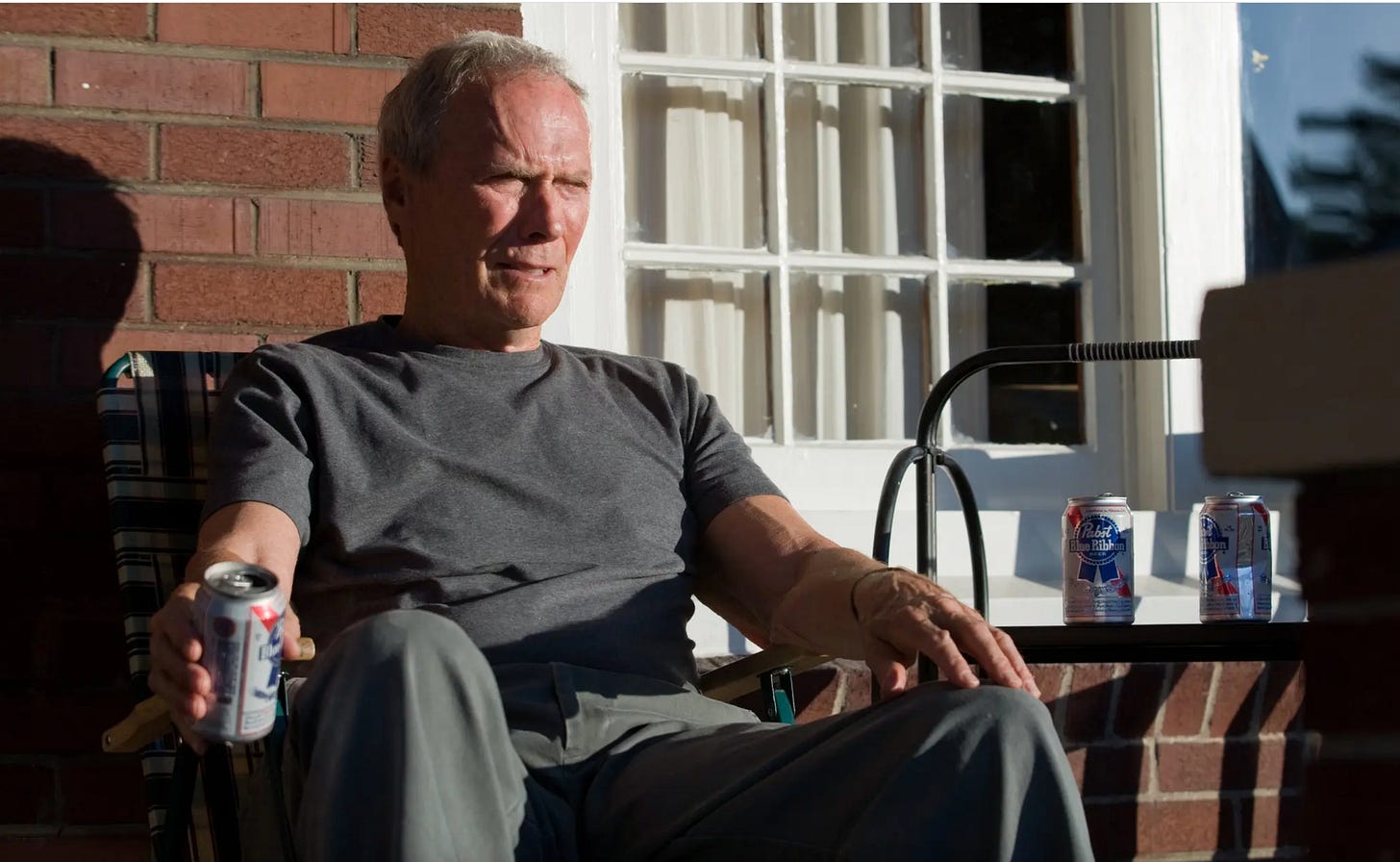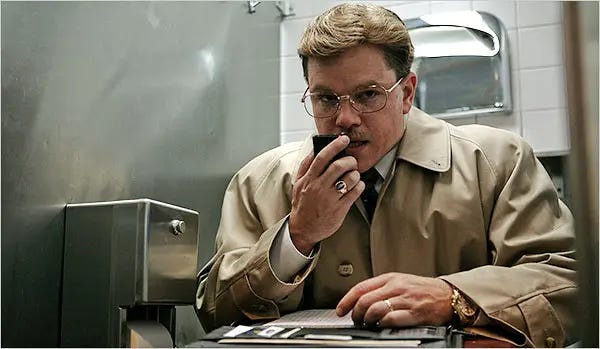Volume 5, Issue 7: The Legend of Tennessee Moltisanti
"You ever feel like nothin' good was ever gonna happen to you?" "Yeah, and then nothin' did."
Here is a button where you can subscribe to this newsletter now, if you have not previously done so. I do hope that you enjoy it.
There is a moment in life when you realize that you have turned into Clint Eastwood in Gran Torino. I believe I have found mine.
My neighborhood here in Athens is a residential one, called Five Points, just off the campus of the University of Georgia. I’m a 10-minute walk from Stegeman Coliseum, where the Georgia basketball teams play, and about a 20-minute walk from Sanford Stadium, where the football team plays. If you’ve read my novel How Lucky, you know this neighborhood well because it’s where the narrator and protagonist Daniel lives. I had him reside roughly where I reside just to keep it simple; I was already putting so much work and research into trying to write the book from the perspective of someone with a disability that I don’t have that I figured I’d lower the difficulty elsewhere by having him essentially live where I do. At the very least, I could be sure I’d get the streets right.
When we moved here from New York City in 2013, when this house had only three people living in it rather than four, it was the unofficial policy of realtors in Five Points to try to show open houses only to adults, rather than college students, to maintain a community of grownups and families rather than a community of people wandering home from frat parties and vomiting on the front lawn. Over the last 11 years, as everything in this country has become more end-stage, zero-sum, get-yours-while-you-can-before-everything-explodes craven and shameless, this has changed: The neighborhood has been slowly infiltrated by Airbnb owners who don’t even live in town (something we’re trying to do something about) and college students whose wealthy parents, already paying exorbitant college tuitions, will buy a house when their kid is a freshman and flip it when they graduate, which is great for their portfolios but lousy for anyone who actually lives in the town where their kid goes to school. But it’s fine. It’s still a nice neighborhood. You figure it out. I’m not too far from having a couple of front-lawn-vomiting college students in this house myself, after all. Everybody complains about These Kids Today, except when they’re their kids.
But it is undeniable that there is lot more of everything in the neighborhood: More college students, more noise, more chaos. But more than anything else: There are more cars. I did not have a car in college and would argue that my college experience was exponentially better because of it: Like in New York City, you can always have a little bit more fun when you know you can just walk home when you’re the night is over. But every college kid seems to have a car today. A disturbingly high percentage of them in Athens have huge pickup trucks, an obviously vital tool for them, considering the amount of lumber college students are constantly required to haul. And these vehicles have to go somewhere. It’s nice to see people walking the streets of my neighborhood. It’s not to so nice to see huge trucks piling up everywhere in it.
And here comes the part where I am the old man on the lawn, growling about the world as crumpled up Pabst Blue Ribbon cans pile up around him.
Nearly every house in my neighborhood has a driveway, a car port or both. This is a walkable neighborhood, but people still have cars, and thus their houses are designed with designated places to park them. My house is fortunate enough to have a spot for my car and my wife’s car while still having space for two or three other vehicles, if we were to happen to need them. Most houses are the same. It’s a nice neighborhood.
What I have discovered, however, is that most people, or at least most college students, do not like to use their driveways. (Note: I make exceptions for work vehicles, lawn maintenance, construction crews and the like. They’re working, after all.) They—perhaps because they have grown up in more rural or suburban areas where you have enough space that you can go weeks without ever seeing the face of anyone who doesn’t live in your house—have instead decided, when they have reached their home, they will just park their car on the street outside and then walk on inside. This is fine in places that aren’t neighborhoods and don’t have to cram many people in a compressed area; certainly I parked on the street all the time when I grew up in Mattoon, Illinois and it didn’t cause any problems at all. But that was because Mattoon is a small town, with wide, open roads. But our neighborhood, like most neighborhoods in actual towns, is not built like that. Our roads are tight, with room for just two lanes: People live here, after all. If you park on the street in front of your house in Five Points, rather than the driveway, you are doing something larger than just putting your vehicle away for the night: You are blocking an entire lane of traffic.
Thus, over the last five years, even though these houses all have empty driveways just waiting for someone to pull their cars in, every road in my neighborhood has become a one-lane monstrosity. No matter when you are driving, you are playing chicken with the cars coming your direction. There is a moment, on every street, when you see a car approaching yours that each of you have a realization: Only one of us is getting through here. This leads, all day, every day, to cascading traffic issues, irritated drivers, dangerous road conditions (wordlessly navigating which car gets to take the one open lane at which time is particularly fraught if it happens to be raining) and a general sense of everybody being on top of you all the time. It turns what should be a pleasant experience of driving down the road in your neighborhood into Frogger, or Q*bert. Actually, that’s what it feels like driving in my neighborhood: It feels like Q*bert.
To you, dear reader of this newsletter, I may seem on a weekly basis like a calm, affable, rational voice of reason, just a regular person trying to make their way around the world like the rest of us, a friendly optimistic Midwesterner who, often in the face of all available evidence, always tries to assume the best in people. And on the whole, I do think I am like this, or at least attempt to be. But as my children, whom I drive to their respective schools every morning, can attest, this is not the person I am when I drive through my neighborhood. I am, put simply, an extremely cranky old man. I curse. I growl. I groan. I curse some more. Veins pop out of several spots on my forehead; my teeth grind; the steering wheel gets punched. Driving through my neighborhood is the time when I see the world at its worst. My younger son Wynn asked me this week, “Dad, why are you talking to all the other people in all the other cars? They can’t hear you. You do the same thing when you yell at the television during the Illini games. They can’t hear you either.” He is too young to realize I don’t want to be heard. I just want to grouse. Like a cranky old man.
(Though deep down I do believe the Illini can hear me.)
This isn’t healthy. It’s something I am working on. But then again: I am not the one who, on a daily basis, blocks a whole lane of traffic because they have decided that a half a second of their personal convenience is worth dozens of total strangers getting stressed out all day and all night long. The only person that matters is them. The only person that matters is them.
“The only person that matters is them!” I yell, at 7:10 in the morning, every weekday morning, to the air, to no one, except there’s a nine-year-old boy sitting in the backseat hearing all of it. Perhaps at one point in the past, hearing his father yell at the sky might have scared him a little. Now he just rolls his eyes, the way I used to roll my eyes when my dad told me that the music the guy from Nirvana was making wasn’t music at all, or that I was watching too much junk on television, or it sure seems like no one wants to work anymore. Lately Wynn has begun ignoring me all together. That’s just Dad shaking his fist at the heavens. That’s just Dad complaining. He’s old. That’s what old dads do.
I am so incredibly lucky in this life. To have the people who live in this house, to be able to build a career, to do work that I am passionate about, to have a home where I and the people I love can feel safe and secure. I do not think I done anything to deserve these things, but I am nevertheless not giving them back. And I now know that I have reached a point in my life where I am truly living the American Dream: I have become my father, like he became his father, like they all became every father. Everything’s fine. And we’re still randomly grousing about something that’s not important to anyone other than us. This is part of getting older. This is how it’s supposed to work. This is a new stage in my life. I think I might be good at it. Because seriously: Your driveway is right there.
Here is a numerical breakdown of all the things I wrote this week, in order of what I believe to be their quality.
A Super Bowl That Went From Dud to Dynamite, New York. A good reminder that all people need to be happy is a great third act.
MLB Season Preview: Managers on the Hot Seat, MLB.com. This is going to be a very stressful year for Yankees fans.
The Unique Magic of Patrick Mahomes, NBC News. I wrote about how historic Mahomes was before the Super Bowl.
What You Missed This Baseball Offseason, MLB.com. If you stopped looking at baseball after the World Series, you missed a lot!
PODCASTS
Grierson & Leitch, we discuss “Suncoast” and “Lisa Frankenstein,” and then reboot the 2009 film “Up in the Air.”
Seeing Red, no show this week, back next week.
LONG STORY YOU SHOULD READ THIS MORNING … OF THE WEEK
“What Do We Owe a Prison Informant?” Charles Bethea, The New Yorker. I’ve always wondered how they draw up the particulars of deals for informants in criminal cases. Perhaps not surprisingly, it’s pretty hazy!
ONGOING LETTER-WRITING PROJECT!
This is your reminder that if you write me a letter and put it in the mail, I will respond to it with a letter of my own, and send that letter right to you! It really happens! Hundreds of satisfied customers! I am caught up on anything sent in 2023 now, so if you haven’t gotten a response, it got lost, send me another one!
Write me at:
Will Leitch
P.O. Box 48
Athens GA 30603
CURRENTLY LISTENING TO
“Even Better Than the Real Thing,” U2. I spent a long time thinking about which U2 song I’d include after seeing them at The Sphere last week, and then I decided not to overcomplicate it. Surprisingly, this is the fourth U2 song to make it to my newsletter playlist. I might be a bigger fan than I realized.
Remember to listen to The Official Will Leitch Newsletter Spotify Playlist, featuring every song ever mentioned in this section.
Also, now there is an Official The Time Has Come Spotify Playlist.
I was delighted to get to be a part of the book launch for Jason Kirk’s really excellent new novel Hell Is a World Without You last night, and it was a delight to get to hang with the Shutdown Fullcast crew. You should absolutely buy the book, it’s really something.
Got back to Athens in time to watch this dude ride a horse and get a ribbon. I am very impressed by both of those things.
Have a great weekend, all.
Best,
Will








I understand your frustration. My experience in college that parking in the driveway was a great way to get your car blocked in, then your housemate would be gone to class and you couldn't get out to go get groceries, go to walmart, go to the bar, or get out of town for the weekend. I remember taking summer classes once and having to wait 4 hours before my fraternity brother showed up to move his car when all I wanted was get out of that small town for a couple days. I don't think I parked in the driveway again that summer. If you don't trust the people you live with enough to have keys to your car, it's a problem.
As a relatively old guy in my office, the owner was grumbling that no one wanted to work anymore. I pointed out that most of his employees valued time off over regular pay for hours 35-50 worked in a week. When he offered more money to work extra shifts, he generally got the workers he wanted. For some reason, he didn't think the laws of supply and demand should apply to when he wanted to buy labor.
Wait 'til you really ARE old & you yell at the people on the 5am "Sportscenter" to "SHUT UP" because they're talking about "your team" or some other "stupid" thing - WHILE telling those you're reading on your computer to "F... off" or something similar. Your just sorta "faux" old now....😁